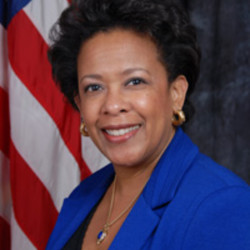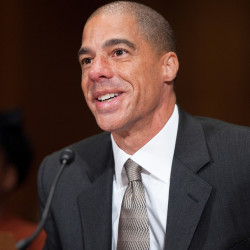Steve Sailer
VDARE
February 17, 2016
California Attorney General Kamala Harris, one of the “black” candidates for the Supreme Court
Tom Goldstein, the editor of SCOTUSblog, gives his analysis of Obama’s potential Supreme Court nominees, which turns out to be almost wholly from an identity politics angle:
How the politics of the next nomination will play out
The best candidate politically would probably be Hispanic. Hispanic voters both (a) are more politically independent than black voters and therefore more in play in the election, and (b) historically vote in low numbers. In that sense, the ideal nominee from the administration’s perspective in these circumstances is already on the Supreme Court: Sonia Sotomayor, the Court’s first Latina.
The media, and Sotomayor herself, are convinced that she represents the Latinx tidal wave, but I’m not sure that Mexican-Americans are all that impressed by a Puerto Rican. Obama might go for a Mexican, although there aren’t many with Supreme Court-level intellectual intensity.
On the other hand, I think the President personally will be very tempted to appoint a black Justice to the Court, rather than a second Hispanic. His historical legacy rests materially on advancing black participation and success in American politics. The role Thurgood Marshall previously played in that effort is inescapable. The President likely sees value in providing a counterpoint to the Court’s only black Justice, the very conservative Clarence Thomas.
For those reasons, I think the President will pick a black nominee. I’ve long said that the most likely candidate for the next Democratic appointment was California Attorney General Kamala Harris. She is fifty-one. A female nominee has significant advantages as well. That is particularly true for the candidacy of the likely Democratic nominee, Hillary Clinton. For reasons I’ve discussed elsewhere, I think her nomination is difficult to oppose ideologically, given her history as a prosecutor.
From Wikipedia:
Harris was born in Oakland, California. She is the daughter of an Indian mother, Dr. Shyamala Gopalan Harris—a breast cancer specialist who emigrated from Chennai, India, to the United States in 1960[13]—and a Jamaican American father, Stanford University economics professor Donald Harris.[14]
Harris looks like she inherited her hair from India rather than having to buy it from India.
She has one younger sister, Maya, who is now married to Tony West, a former Associate Attorney General of the United States.[15] … Harris attended Howard University in Washington, D.C.,[20] where she was initiated into Alpha Kappa Alpha sorority …
Here’s the transcript of an NPR interview in which a Kappa Alpha Kappa spokeswoman denies that Kappa Alpha Kappa ever applied the “paper bag test” to rushes, but then says, sounding like Julian Bond on SNL in the 1970s:”What I will say, if there was a bias, it was on intelligence.”
SCOTUSblog goes on:
If Harris wanted the job, I think it would be hers. But I don’t think she does. Harris is the prohibitive favorite to win Barbara Boxer’s Senate seat in the 2016 election. After that, she is well positioned potentially to be president herself. If nominated, she would have to abandon her Senate candidacy and likely all of her political prospects. So I think she would decline.
But Attorney General Loretta Lynch, who is fifty-six, is a very serious possibility. She is known and admired within the administration. … Her history as a career prosecutor makes it very difficult to paint her as excessively liberal.
Perhaps Lynch’s age would give the administration some hesitancy. They would prefer to have a nominee who is closer to fifty. But because the nomination would principally serve a political purpose anyway, I don’t think that would be a serious obstacle.
The fact that Lynch was vetted so recently for attorney general also makes it practical for the president to nominate her in relatively short order. There is some imperative to move quickly, because each passing week strengthens the intuitive appeal of the Republican argument that it is too close to the election to confirm the nominee. Conversely, a nomination that is announced quickly allows Democrats to press the bumper sticker point that Republicans would leave the Supreme Court unable to resolve many close cases for essentially “a year.”
I think the administration would relish the prospect of Republicans either refusing to give Lynch a vote or seeming to treat her unfairly in the confirmation process. Either eventuality would motivate both black and women voters.
 In contrast to a lot of the black exotics who have flourished in the Obama Administration (such as Eric Holder and, most notably, the President), Lynch seems like a pretty normal African-American, born in Durham, North Carolina, the daughter of a Baptist minister and a school librarian.
In contrast to a lot of the black exotics who have flourished in the Obama Administration (such as Eric Holder and, most notably, the President), Lynch seems like a pretty normal African-American, born in Durham, North Carolina, the daughter of a Baptist minister and a school librarian.
It’s not clear to me if it matters to African Americans or not whether the black nominee would be a representative of the typical African-American community at its best like Loretta Lynch or an exotic like Kamala Harris. My guess is that it matters in black v. black contests (e.g., Bobby Rush beats Barack Obama) but not in something that can be pitched as black v. white (e.g., Obama v. Romney). When it comes to national politics, blacks tend to be racialist and true believers in the one drop rule. (I have the hunch that a lot of black women who look more like Lynch think they look like Harris.)
Other black women have been mentioned as possible candidates. For example, California Supreme Court Justice Leondra Kruger is well known as a former lawyer in the Obama administration, but at thirty-nine probably too young. I also discussed Danielle Gray above. She is widely admired, but lacks the stature of the attorney general.
Two other potential white female nominees are likely to get close looks. Judge Jane Kelly is a young Obama appointee to the Eighth Circuit who was unanimously confirmed by the Senate. Homeland Security Advisor Lisa Monaco is even younger at forty-seven.
In a previous version of this post I pointed to Paul Watford, an Obama appointee to the Ninth Circuit, as the most likely nominee. Watford is in his late forties. He is well respected and reasonably well known in Democratic legal circles. I still think he is a serious candidate, but the fact that Lynch is a woman gives her nomination a very significant advantage. The same goes for two well-respected appellate judges who are black, the Second Circuit’s Ray Lohier and the D.C. Circuit’s Robert Wilkins.
 Watford looks like the African-American J.K. Simmons.
Watford looks like the African-American J.K. Simmons.
This is totally off the topic of the Supreme Court, but my vague impression is that individuals who look like Watford usually have one white parent rather than be from a long line of paper bag test-passing Creole of colors. (I haven’t been able to find out anything about his parents.)
You get a lot of distinctive looks in a first generation cross, but then over the generations mixed black-white people settle into a “type.” Anthropologist Henry Harpending talks about that with Uighurs, a Central Asian group on the border of the white and East Asian worlds, who indeed look like a cross between the two races, but who also look like the distinctive Uighur type they’ve been for a long time.
But it’s hard to put this into words and it’s not the kind of thing that’s encouraged to talk about these days. So, Watford’s parentage is a test of my understanding of type theory, with sample size n=1.
The favorite candidate in Democratic legal circles is generally Judge Sri Srinivasan of the D.C. Circuit, followed by Patricia Millett of the same Court. Both are recent Obama appointees. Srinivasan is a Indian American. Millett is a woman. Both would fit the ideological profile that the administration would want. But neither provides the same political benefit.
 Daily Stormer The Most Censored Publication in History
Daily Stormer The Most Censored Publication in History




